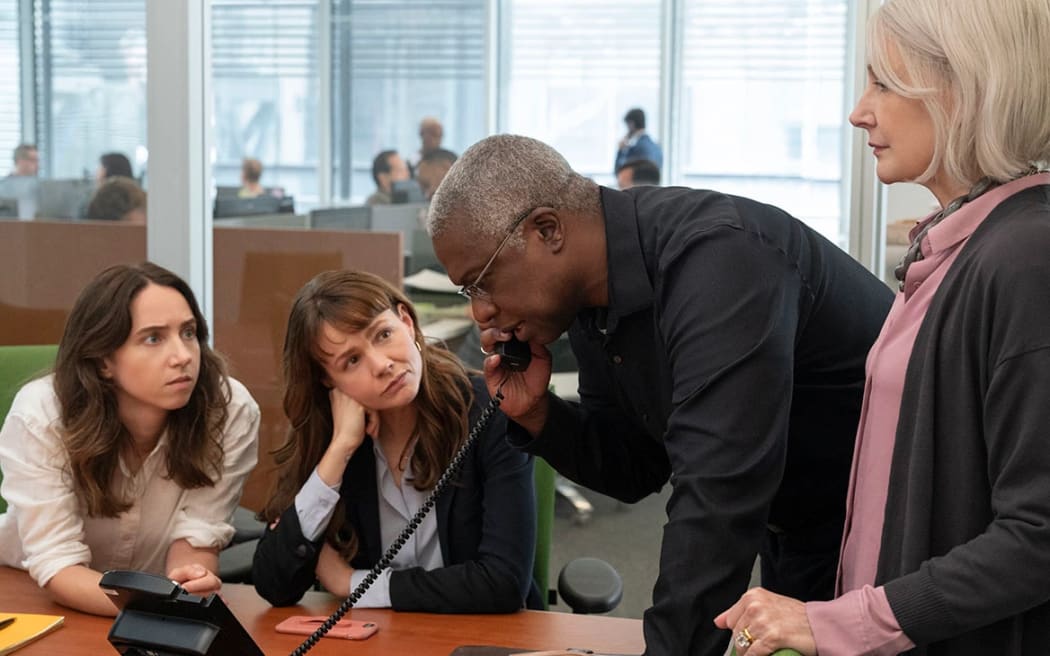She Said tells how the New York Times took on Hollywood mogul Harvey Weinstein and along the way encouraged the famous #Me Too movement.
It follows in the footsteps of journalist classics like Spotlight, All the President’s Men, Deadline USA and The Front Page.

Photo: Universal Pictures
Even though these days we mostly get our information from TV and social media, the idea of the old-fashioned, crusading print journalist remains very appealing.
The old newspaper saying goes “News is what someone, somewhere, wants to hush up. All the rest is advertising.”
The trouble is that without advertising, the newspapers go out of business. That’s the paradox at the heart of every crusading journalist story. Will the truth come out, or will it be hushed up by the advertisers?
And the story of She Said turned out to be too big to hush up.
But it didn’t happen on its own. Sexual harassment has been the business world’s dirty secret forever – wherever there’s a power imbalance and sex is treated as a perk of the job by, mostly, the top men.
Until one day the mighty New York Times decided to try and shine a light on it.
The Times editor – played by Patricia Clarkson – puts journalist Jodi Kantor – Zoe Kazan – onto the story. And Kantor reports back that the worst offender seems to be the movie business. But that nobody is talking.
Kantor consults with another journalist, Megan Twohey – played brilliantly by Carey Mulligan –whose last story revealed the bad behaviour of billionaire Donald Trump.
Despite Trump’s undoubted clout, Twohey got enough witnesses to back up her story.
Twohey and Kantor decide to work together on this story, and it soon transpires that Hollywood’s worst offender seems to be one of its most powerful producers, Harvey Weinstein.
And this is how the story that toppled a monster came about.
Structurally She Said is All the President’s Men, relocated from 1970s Washington DC to Los Angeles, New York and London in the 1990s and 2000s. And it’s fascinating how little the methodology has changed in fifty years.
We may have the Internet and cell-phones now, but a journalist’s job remains the same. It’s legwork, following sources – often face to face - looking for confirmation. And in this case, while everyone seems to know the story, no-one is prepared to talk, or at least go on the record.
And She Said is a blow-by-blow account of how a system built to punish the innocent and protect the guilty was defeated by that much-maligned body of men and women, the mainstream media.
What I loved about She Said was that it told its story with the minimum of histrionics. It simply showed the grit and determination of two journalists, and the remarkable courage of the few women who finally stood up.
As the title suggests, She Said is a very female driven film. Most of the talent - in front of and behind the camera - are women.
Kantor and Twohey are shown as working mothers, often trying to get other mothers to talk about things they’ve tried to suppress for years.
And the film reminds us that simply nailing one perpetrator is hardly solving the problem.
Hollywood’s casting couch was notorious for as long as there’s been a Hollywood, and outside the film business the powerful prey on the powerless every day.
It’s easy to say that one movie – or for that matter one story, even in a prestigious paper like the New York Times – can only do so much.
But sometimes “so much” is considerably better than “not enough”.
She Said’s a great, old-fashioned newspaper story, illuminated by a terrific cast, including the best I’ve seen Samantha Morton in years.
Heartily recommended, though depressingly She Said opened badly in the States, I believe.
Whether this is because American audiences don’t want their rose-coloured view of Hollywood sullied, or they need the idea of “newspapers” explained to them, I can’t say.

